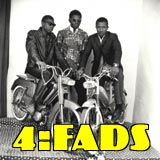 Once, long before I knew what a sunrise looked like, my father offered me and my brothers what his father had offered him: the chance, for one night, to stay up as late as we wanted. No rules, no bedtime, all the T.V. and ice cream we could stomach. Our father was certain that, after several hours of pre-teen hedonism, we would eventually begin to yawn; the realization would sink in that staying up past eleven o'clock is boring; and the following morning, stumbling bleary-eyed and bloated down the stairs to breakfast, we would regret the whole debacle. As it happened, we never took him up on the offer. Our father had explained his predictions ahead of time, and his prematurely disclosed moral made the whole adventure less appealing. What might have been "Saturday Night Fever" had become a Sunday Afternoon Special. I regret to report that my entire childhood too closely resembles this missed opportunity writ large. Morals always seemed to appear before the adventure. And, fool that I was, I thought I could outsmart whatever temptation came my way. Snap bracelets, action toys, "Co-ed Naked" t-shirts, dreams of being a fireman: I shunned all of these dalliances in the persistent attempt to shield myself from fads. Avoiding fads, both personal and cultural, seemed like a good idea. They make you lose control over your mind (gourmet coffee is worth it) and your character (I do like "Mortal Kombat" video games). They allow you to gloss over discrepancies, fudge inequalities, and justify stupidity. Plus, fads are by definition short-lived. They're hardly worth it. However sweet, they always promise the bitter aftertaste of diminished self-respect. My fear of doing or saying anything I might later regret dovetailed nicely with my parents' distrust of popular culture. What emerged was a slightly robotic version of a child, complete with solid color t-shirts and a vaguely irritating air of self-righteousness. I was more comfortable smiling knowingly with my best friend's mother than mustering anything close to his enthusiasm for remote-control truck racing. Fearful of being type-cast as an "eight year old," I lied to my aunt that my favorite food was broccoli, and, when confronted with soaring acrobats balancing atop a dozen stacked chairs, explained matter-of-factly to my impressed uncle that, "you see this a lot in circuses." To have known then that being eight means having the right to prefer chocolate to broccoli! The freedom to be awestruck by acrobats! If I had only realized that being a kid in the 1980s gave me special license to be intoxicated by Ninja Turtles and denim jackets, perhaps I would have stopped spending the whole time trying to figure out how long each fad would last. As I've since learned, it's sometimes more fun to be a naked emperor than a clairvoyant kid. Believing that we're wearing the finest in fashion is what conjures enough temporary insanity to lean over and introduce ourselves to the person across the bar. Building a gossamer bridge over gaps of logic might be reckless, but there have been times in my life when what has mattered more than the bridge itself was just getting to the other side. The art critic Peter Schjeldahl has defended "temporary meaning" by arguing "there are some things that, if you don't enjoy them in their moment of fashion, you're going to miss entirely." Topic 4: Fads is dedicated to this very premise. Fads will, by definition, be quickly dismissed and possibly regretted. Their consequences may be painful; they make us look foolish. But I've stopped predicting their downfalls and started to bask in their absurdity. There's so much to explore between bedtime and breakfast. 
Back to Top | Table of Contents | Subscribe to Topic
 | 
